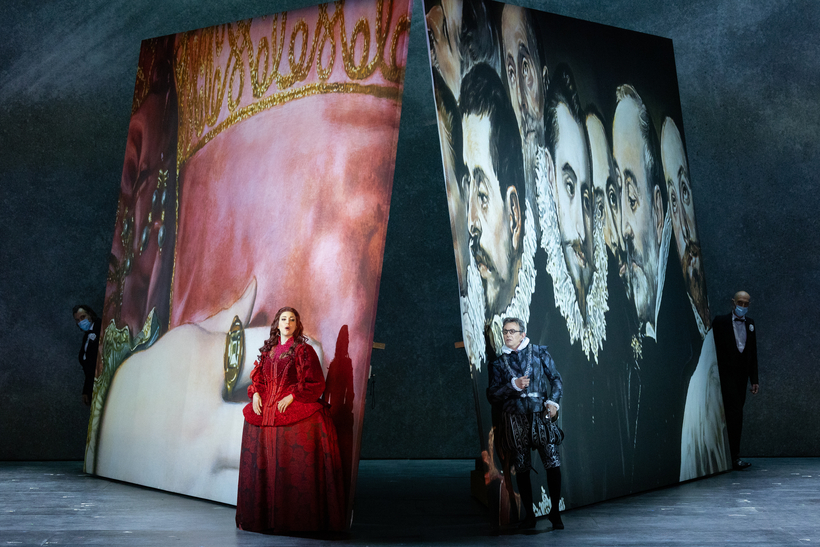Love is hell in The Satin Slipper, the Roman Catholic epic of salvation that Paul Claudel published in 1929, little expecting ever to see it on the stage. Behind the drama lies the imbroglio that shaped his life: a tortured affair in his 30s—Claudel’s first sexual entanglement of any kind—with a married mother of four who vanished without a trace carrying his child.
The pair’s theatrical avatars are the conquistador Don Rodrigue, Spain’s viceroy in the New World, and Doña Prouhèze, an Amazon for Christ with an island citadel in the Atlantic to defend. Spanning oceans, theirs is a long story. Though the lovers’ carnal desire goes unconsummated, Rodrigue and Prouhèze think of little but the flesh and their immortal souls, clothing their agony in white-hot theological debate. A letter upon which much depends takes 10 years to arrive. That’s how it was in the Age of Discovery, circa 1500.

In a stroke of what I’m tempted to call Providence, a lyric adaptation of The Satin Slipper premiered before a live audience at the Opéra de Paris in May, on exactly the date announced before the pandemic, reopening the house after a virtual eternity of disruptions. Marc-André Dalbavie’s score, set to the dexterous Raphaèle Fleury’s streamlined libretto, clocks in at just under five hours—seven hours less than an uncut account of the play, yet still 40 minutes more than a brisk Götterdämerung or 10 minutes more than a leisurely one. But in Dalbavie’s hands, time moves quickly. His orchestra swells and rumbles from the depths of the waters, cracks and rustles like sailcloth in a gale, sifts down from on high like the tail of a passing comet.
As Prouhèze, the Swiss mezzo-soprano Ève-Maud Hubeaux takes her place in the history books. Imperious in carriage, mettlesome in tone, she simply bristles with innate authority. Perhaps her personal history suggests why. Born into a nonmusical family, Hubeaux studied piano and voice privately, bypassing the conservatoire as she completed a law degree, then headed straight into the theater to find her wings. Among canaries, she’s a condor. To the Italian bass-baritone Luca Pisaroni falls the earthbound part of the woebegone Rodrigue, ground in the dust by erotic longings. Late in the opera, from opposite poles of existence, they rhapsodize—for all the world like twin Men of La Mancha—of impossible dreams and unreachable stars, martyrs of passion in a blaze that lifts cliché to transcendence.

That’s the climax, but you’ll take away lots more. As the innocent Doña Musique and the Viceroy of Naples, Vannina Santoni and Julien Dran—a standard-issue lyric-soprano-and-tenor pair—share a bewitching duet in a more temperate vein. As the Guardian Angel and other celestials, the countertenor Max Emanuel Cenčić touches no end of unearthly chords. And that siren of the silver screen Fanny Ardant, heard on tape, voices the musings of the Moon. Back at ground level, an onstage Baroque combo comes in for sneers from the characters onstage, even as they make listeners out front very happy. As Prouhèze’s tomboy daughter Doña Seven-Swords, all in scarlet, the soprano Camille Poul streaks through the final act like a junior Errol Flynn.
Oh, and there’s lots to watch. Claudel said he wanted The Satin Slipper to look makeshift, as if thrown together on the fly. Sometimes playfully, sometimes sumptuously, Stanislas Nordey’s production brings about that illusion. The designs by Emmanuel Clolus (sets) and Raoul Fernandez (costumes) summon up Spain’s siglo d’oro in imagery from Velázquez and El Greco, precisely the artists whose visions we long to see.
The Satin Slipper will be available for streaming on the Opéra de Paris Web site through September 13
Matthew Gurewitsch writes about opera and classical music for AIR MAIL. He lives in Hawaii

